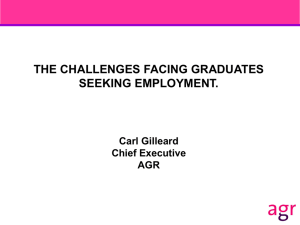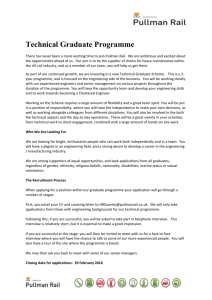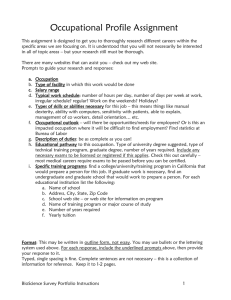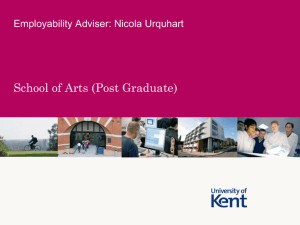How to be successful in the graduate job-market
advertisement
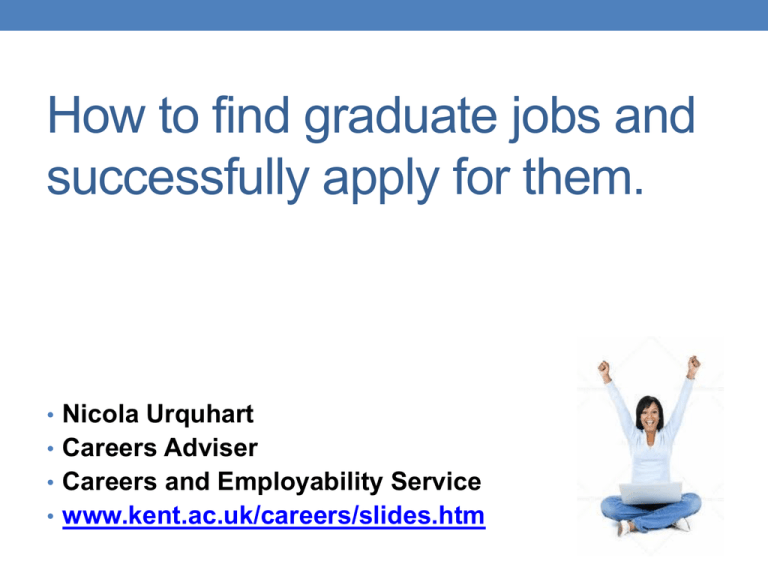
How to find graduate jobs and successfully apply for them. • Nicola Urquhart • Careers Adviser • Careers and Employability Service • www.kent.ac.uk/careers/slides.htm Some popular career choices for humanities graduates What is Employability? ‘A set of attributes, skills and knowledge that all labour market participants should possess to ensure they have the capability of being effective in the workplace – to the benefit of themselves, their employer and the wider economy.’ (CBI, March 2009) Changing world of work: • Global economy • More career changes • Roles change • New technology/social media • Need to focus on employability as opposed to employment • Changes to graduate recruitment Changes to graduate recruitment Previously… Degree + good application + good interview = graduate role Changes to graduate recruitment Employers increasingly focusing on attributes in addition to traditional employability skills Successful candidates need to be able to demonstrate these attributes on their applications and articulate them at interview Skills and attributes that graduate recruiters are looking for? Communication Adaptability Self awareness Leadership Energy Contextual/cultural awareness Report writing Problem Solving Adaptability Numeracy Positive attitude Reflection Confidence Team working Integrity Capacity to develop Reliability Drive and resilience Project management IT skills Business and customer awareness Enterprise Enthusiasm/passion Planning and organisation Maturity What skills and attributes do employers want? Transferrable skills • Communication (oral, • • • • • • written) Negotiation Team working Planning and organisation Time management Leadership Problem solving Attributes • Integrity • Adaptability • Energy • Drive and resilience • Reliability • Enthusiasm and passion • Self awareness and confidence Where to look for jobs Types of jobs • What are you looking for? • Graduate training schemes? • Other graduate jobs? • Graduate Internships? • Other temporary (stepping-stone) jobs Where to look for vacancies • Check job vacancies to find out about the types of roles being advertised www.prospects.ac.uk www.milkround.com www.targetjobs.co.uk www.kent.ac.uk/ces • Graduate directories • Careers and Employability Fairs • Social Media • Recruitment Agencies Vacancy Sites - graduate www.kent.ac.uk/careers/graddirectories.htm • www.prospects.ac.uk • www.get.hobsons.co.uk • www.targetjobs.co.uk • www guardianuk300.com • www.top100graduateemployers.com/ • www.kent.ac.uk/ces/vacancies.html Graduate Schemes still open ... • Accenture • Ernest & Young • Aldi • EU Careers • Arcadia • IBM • BAE Systems • L’Oreal • BBC • Mars • Bloomberg • McDonalds • British Sugar • MI5 • Cancer Research UK • National Grid • Deliotte • Penguin • DIFD • TeachFirst • Diageo • BBC Example Graduate scheme (Bloomberg ) • Finance • IT • Media • Sales Example graduate scheme: DFID • Engineering • Finance • General Management • IT • Purchasing • Research and Development Other resources • Professional bodies • Institute of Practitioners in Advertising www.ipa.co.uk/ • Chartered Institute of Marketing www.cim.co.uk • Chartered Institute of Personnel & Development www.cipd.co.uk/ • Recruitment agencies • FASHION - George Ellis Recruitment • MUSIC - Handle Recruitment • ACCOUNTANCY - Hays Accountancy Personnel • SECRETARIAL - Nice People Employment Bureau Careers Fairs Graduate Events The Summer Graduate Fair ExCel, London, 5th June 2013 www.summergradfair.co.uk TARGETjobs/The Careers Group The London Graduate Fair Business Design Centre, Islington 20th March www.londongradfair.co.uk/summer For fairs elsewhere in the UK, see www.prospects.ac.uk/links/careerfairs Social media • Social Media: “an umbrella term that defines the various activities that integrate technology, social interaction, and the construction of words, pictures, videos, and audio.” www.wikipedia.org • Enabling conversations • Facilitating discussions Why should you be using social media? • Enables you to build links and to learn about an industry and potential employers (commercial awareness) • Some employers will expect you be using it e.g. the media, advertising, publishing and many more. • Information comes to you • Allows you to manipualte what employers see when they ‘google’ you • Allows you to make an impression (good and bad) Ideas on who to follow: • Companies/employers you are interested in working for • Industry experts/bloggers • Professional networks and industry/professional publications • Job sites and job boards • Recruiters / head-hunters / HR personnel who are hiring for the roles you're targeting • @unikentemploy Social media can help you showcase your skills. • Linkedin Business and customer awareness, confidence , job vacancies • Twitter Communication, information Job vacancies Blogging Show-case commitment and talent. What else can you do? Network! • ask your friends • ask your relatives • ask your “network” • ask a past Kent graduate • ask a careers adviser www.kent.ac.uk/careers/sk/CJ.htm APPLICATIONS AND INTERVIEWS How to succeed Successful applications What employers say… "Few students are able to articulate what they have gained from their experience in higher education." (Association of Graduate Recruiters, 1995) What is the purpose of a CV? • • • To inform the employer about your education, work experience, skills and interests To show how you meet the criteria so the employer can not deselect you To ‘sell’ your qualities and to persuade the employer to invite you to interview Producing a CV Matching up your CV with the position/company • • It is not ‘one size fits all’, you need to tailor your CV to each position you apply for. Research the organisation. Do they have a mission statement or core values? What will they be looking for in you? Who works there at the moment? What are they passionate about? What makes an effective CV and covering letter • Right format • Well presented • Proof read/consistent tenses • You have included all the necessary information • Your skills and abilities are clearly evidenced • Conveyed your understanding and enthusiasm for the job • Targeted it to the job What does it need to contain? • Personal details • Education and qualifications • Work experience • Skills • Interests and additional information • References Don’t be constrained by headings. • Languages • Scholarships/Awards • Voluntary work • Relevant experience • Positions of responsibility • Publication/Presentations • Conferences attended • Research skills • Additional skills Hints on wording • Avoid personal pronouns • • • • • • No “I’s” Avoid producing a passive CV Start with verbs wherever possible Use short sentences & concise phrases Focus on accomplishments Refer to specific projects with quantifiable results Try to incorporate wording used in that sector Make use of Action Verbs created instructed analysed produced negotiated designed calculated maintained administered controlled reviewed observed consolidated delivered founded increased studied invented supplied detected programmed recommended distributed developed solved prepared installed selected arranged formulated solved started Application forms (online) • Read the question! • Re-read and highlight the main points • Write your answer • Check you have covered each point • Include key words STAR approach (online) For questions where you are asked to ‘explain a time when…’, it is useful to use the STAR approach: • Situation – set the scene • Task - what needed to be done/achieved? • Action - this should take up about 80% of the answer, what action did YOU take? • Result - this is the ‘proof’ that you succeeded, try and give evidence such as statistics if possible Applicant Tracking Systems Most major recruiters rely on Applicant Tracking Systems to initially scan through CVs, covering letters and application forms. If you do not pass this stage, your application may never be seen. Case Study: Olu – Business and IT I applied for 120 placement schemes, the most disheartening thing about it was receiving rejections at 1am in the morning. My applications weren’t even getting to a human being! Allianz was my last shot, and for the first time I made my application relevant, I used key words and I practiced psychometric tests. Not only did I get the placement, but they asked me back after graduation, so I have now started on their graduate scheme. Beating the system • Use their KEY WORDS from: • Job description • Person specification • Values and mission statement section • ‘What we look for’ section Example: Candidate must have strong communication skills and must be fluent in German (ensure highlighted words feature in your application) Here comes the (computer) science bit… Concentrate! 1. Never send your CV as a PDF: Applicant tracking systems (ATS) lack a standard way to structure PDF documents, info can be misread 2. Don't include tables or graphics: ATS can't read graphics, and they misread tables 3. Call your work experience, "Work Experience": The computer might completely skip over your work experience if you haven’t labelled it as such 4. Don't start your work experience with dates: To ensure applicant tracking systems read and import your work experience properly, always start it with your employer's name, followed by your title, followed by the dates you held that title. INTERVIEWS Does what I wear really matter? 37% of employers decided against hiring someone because of what they were wearing 80% of interviewers think it is inappropriate to wear red to an interview 99% of bosses interviewing female applicants say they would be inclined to mark them down if they wore dangly jewellery 95% find low-necked tops and no tights unsuitable interview attire (The Ladders) UoK Careers Fair – November ‘12 Tom: Audit Supervisor Baker Tilly We look for how the candidate is presented. They need to be professional. We also value communication skills and confidence. The thing that annoys us most in the interview process are the ‘know it all’ candidates! Alison, Vanessa, Caroline, Liz Canterbury Christ Church PGCE Interviews – do your research • Be familiar with the employer website • Re-read employer information/ your application form • Remind yourself why you find this employer attractive • Keep up to date with current affairs Interview Questions Interview questions may be: • Hypothetical (what would you do if…) • Competency based (describe a situation where you…) • ‘Traditional’ interview questions (tell me about yourself) In your answers, keep in mind the skills and attributes the employer will be looking for. Be honest. Prepare answers to obvious questions • Why are you applying to us? • Who else have you applied to? • What do you know about our competitors • What makes you suitable for this placement/job? • Why should we employ you? • What do you know about the company/industry/scheme? • Tell us about yourself • What are your strengths and weaknesses? • What do you do in your spare time? • What is your greatest achievement? Prepare for Competency Questions Describe a situation where you had to ..... • show leadership • make a difficult decision • overcome a difficult obstacle • work with others to solve a problem What would you do differently? Hypothetical Questions – What would you do if ………? • What would you do if an irate customer complained about the length of time they had been waiting? • What would you do if you disagreed with something your manager was doing? • What would you do if a person became aggressive when talking to you? Thinking on your feet • Used precisely because it's impossible to work out your answer beforehand • Tests your ability to think quickly, logically, produce practical solutions • Don't panic! Take a few seconds to think - this shows confidence • There may be many possible solutions. Difficult Questions • Ask for some thinking time • Tell them you would need to research the answer • Ask if you can come back to that question later • “I’m afraid I don’t know” is better than waffle • Keep the answer short if you are operating at the edge of your comfort zone Body Language • Shake hands warmly, but wait to be invited to sit down. • Smile • Try to relax - don’t sit on the edge of your chair, but don’t slouch. • Speak clearly and not too fast • Don’t fidget • Keep up good eye contact with the interviewer Prepare Some Questions to Ask • Will I have a mentor in the workplace? • How many people work in the team? • How did you progress to your role? • Would I have a role in the project you described? Undecided about what jobs would suit you Spend time thinking about your values, skills and attributes which jobs would give you the opportunity to use these. • www.prospects.ac.uk (Prospects Planner) • www.kent.ac.uk (Choosing a Career ) SURVIVAL STRATEGIES • Don’t panic! • Be flexible • Plan a strategy for your job-hunting (& review it regularly) • Update your CV and revise it every time you use it to apply for a job • Continue to build up your skills and experience (stop-gap jobs, • • • • • internships, work shadowing, etc) Network - discuss your career ideas with as many people as possible Use a variety of vacancy and information sources Employ creative job-hunting techniques as well as conventional methods Keep motivated and don’t give up! No,no,no,no,no.no,no,noYES! Keep in touch with the Careers Service at Kent – and perhaps use your local University’s careers service too Where to find the Careers and Employability Service Opening Hours: 9-5, Mon - Fri Speak to an adviser: • Quick query, drop in and speak to an adviser 10.30am 12.30pm and 2pm-4pm Monday to Friday. • E mail @careerhelp and an adviser will respond to your query. • You can also book a longer career guidance appointment over the phone or pop in. Stay up-to-date with what is happening • www.kent.ac.uk/ces • www.kent.ac.uk/employability • Follow us on Facebook at University of Kent Student Employability www.facebook.com/UKCES • Follow us on Twitter at @unikentemploy Slides can be downloaded at www.kent.ac.uk/careers/slides.htm

